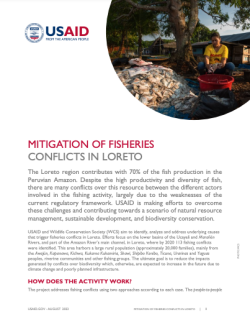The Loreto region contributes with 70% of the fish production in the Peruvian Amazon. Despite the high productivity and diversity of fish, there are many conflicts over this resource between the different actors
involved in the fishing activity, largely due to the weaknesses of the current regulatory framework. USAID is making efforts to overcome these challenges and contributing towards a scenario of natural resource
management, sustainable development, and biodiversity conservation.
USAID and Wildlife Conservation Society (WCS) aim to identify, analyze and address underlying causes that trigger fisheries conflicts in Loreto. Efforts focus on the lower basins of the Ucayali and Marañón Rivers, and part of the Amazon River’s main channel, in Loreto, where by 2020 113 fishing conflicts were identified. This area harbors a large rural population (approximately 20,000 families), mainly from the Awajún, Kapanawa, Kichwa, Kukama Kukamiria, Shawi, Shipibo Konibo, Ticuna, Urarinas and Yaguas peoples, riverine communities and other fishing groups. The ultimate goal is to reduce the impacts generated by conflicts over biodiversity which, otherwise, are expected to increase in the future due to climate change and poorly planned infrastructure.
HOW DOES THE ACTIVITY WORK?
The project addresses fishing conflicts using two approaches according to each case. The people-to-people approach, which gets groups in conflict closer by using their common interests, and the law enforcement
approach in cases where the conflicts involve illegal practices. To address the underlying causes related to the legal framework, the project works with authorities to improve the regulatory framework regarding the granting of rights and surveillance and control of fishing activities. The project generates information about fisheries and its conflicts and facilitates spaces for both dialogue and technical support in order to reach conflict resolution, involving, when necessary, national and regional authorities. Furthermore, the activity will identify gender roles in fisheries conflicts and its contributions to reach potential solutions.
RESULTS ACHIEVED
Elaboration and dissemination of technical studies about fisheries conflicts in Loreto, fisheries in the region, gender roles in the activity, and the importance of fishing activities for regional development.
- Organizations and people dedicated to this activity in Loreto (17 organizations and almost 300 people), including Loreto Regional Production Directorate, Port Authority, National Police have a better understanding of threats to fisheries, fisheries conflicts, and the key role of regulations in the fishing activity – all of which were translated in commitments to improve both control and surveillance efforts.
- People from different groups in conflict, who are part of this activity (five cases), understood the need to manage their conflicts. In three cases of conflicts, people involved have signed agreements, in other two cases the authorities have intervened on actors who work illegally. In addition, they have strengthened their leadership and conflict resolution skills through an Empowerment Program.
- To strengthen the proper management of fishing resources, three communities have conformed fishing surveillance committees recognized by the Loreto Regional Directorate of Production (DIREPRO-L), which monitor compliance with the agreements between the communities, ensuring responsible fishing in their territories.
- The project has improved fisheries control and surveillance systems of governmental institutions. Thanks to capacity-building efforts aimed at public officials, and the development and use of supporting materials such as the Guide to Identify Prohibited Species listed in the Fisheries Management Regulations (ROP as in Spanish), and the guide of the normative that govern fishing activities in the Amazon.

